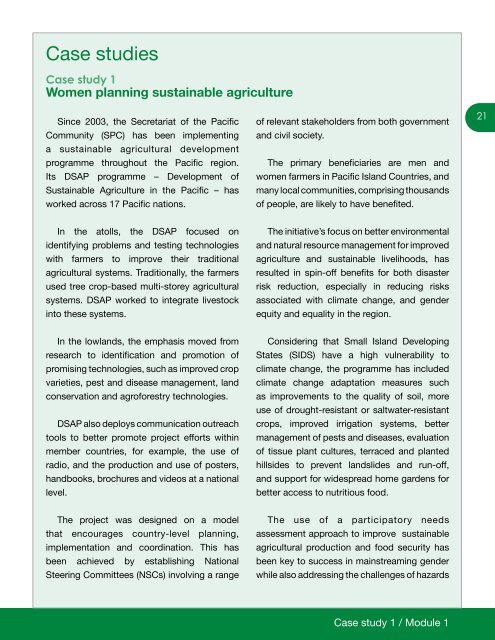GGCA Gender and Climate Change Training Manual - Women's ...
GGCA Gender and Climate Change Training Manual - Women's ...
GGCA Gender and Climate Change Training Manual - Women's ...
You also want an ePaper? Increase the reach of your titles
YUMPU automatically turns print PDFs into web optimized ePapers that Google loves.
Case studies<br />
Case study 1<br />
Women planning sustainable agriculture<br />
Since 2003, the Secretariat of the Pacific<br />
Community (SPC) has been implementing<br />
a sustainable agricultural development<br />
programme throughout the Pacific region.<br />
Its DSAP programme – Development of<br />
Sustainable Agriculture in the Pacific – has<br />
worked across 17 Pacific nations.<br />
of relevant stakeholders from both government<br />
<strong>and</strong> civil society.<br />
The primary beneficiaries are men <strong>and</strong><br />
women farmers in Pacific Isl<strong>and</strong> Countries, <strong>and</strong><br />
many local communities, comprising thous<strong>and</strong>s<br />
of people, are likely to have benefited.<br />
21<br />
In the atolls, the DSAP focused on<br />
identifying problems <strong>and</strong> testing technologies<br />
with farmers to improve their traditional<br />
agricultural systems. Traditionally, the farmers<br />
used tree crop-based multi-storey agricultural<br />
systems. DSAP worked to integrate livestock<br />
into these systems.<br />
The initiative’s focus on better environmental<br />
<strong>and</strong> natural resource management for improved<br />
agriculture <strong>and</strong> sustainable livelihoods, has<br />
resulted in spin-off benefits for both disaster<br />
risk reduction, especially in reducing risks<br />
associated with climate change, <strong>and</strong> gender<br />
equity <strong>and</strong> equality in the region.<br />
In the lowl<strong>and</strong>s, the emphasis moved from<br />
research to identification <strong>and</strong> promotion of<br />
promising technologies, such as improved crop<br />
varieties, pest <strong>and</strong> disease management, l<strong>and</strong><br />
conservation <strong>and</strong> agroforestry technologies.<br />
DSAP also deploys communication outreach<br />
tools to better promote project efforts within<br />
member countries, for example, the use of<br />
radio, <strong>and</strong> the production <strong>and</strong> use of posters,<br />
h<strong>and</strong>books, brochures <strong>and</strong> videos at a national<br />
level.<br />
Considering that Small Isl<strong>and</strong> Developing<br />
States (SIDS) have a high vulnerability to<br />
climate change, the programme has included<br />
climate change adaptation measures such<br />
as improvements to the quality of soil, more<br />
use of drought-resistant or saltwater-resistant<br />
crops, improved irrigation systems, better<br />
management of pests <strong>and</strong> diseases, evaluation<br />
of tissue plant cultures, terraced <strong>and</strong> planted<br />
hillsides to prevent l<strong>and</strong>slides <strong>and</strong> run-off,<br />
<strong>and</strong> support for widespread home gardens for<br />
better access to nutritious food.<br />
The project was designed on a model<br />
that encourages country-level planning,<br />
implementation <strong>and</strong> coordination. This has<br />
been achieved by establishing National<br />
Steering Committees (NSCs) involving a range<br />
The use of a participatory needs<br />
assessment approach to improve sustainable<br />
agricultural production <strong>and</strong> food security has<br />
been key to success in mainstreaming gender<br />
while also addressing the challenges of hazards<br />
Case study 1 / Module 1

















